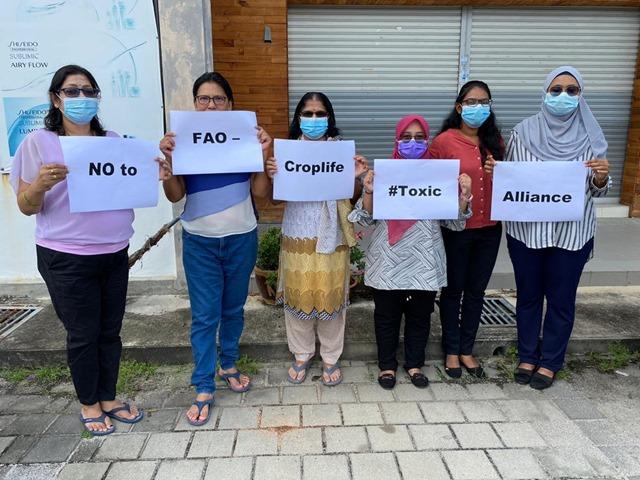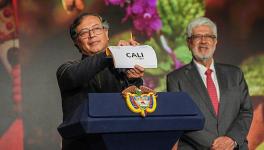Intl. Organisations Ask UN’s FAO to Pull out of Partnership with Pesticide Firms

On October 2, 2020, the Food and Agriculture Organisation of the United Nations announced that it was entering into a partnership with CropLife International, a trade association which promotes agricultural technologies, including highly hazardous pesticides, “to work together and find new ways to transform agri-food systems and promote rural development.”
On November 19, over 350 organisations from 63 countries wrote to the FAO expressing their distress. Shiney Varghese, senior policy analyst at the Minneapolis-based Institute for Agriculture and Trade Policy noted that in 2018 CropLife members made more than a third of their income from the sales of hazardous pesticides. “In the context of this proposed FAO-CropLife partnership, what is even more important is that many of those sales were made to farmers in low- and middle-income countries like Brazil, India and Thailand, while only 27% were made in high income countries,” she said.
The letter writers noted that CropLife members manufacture and promote the use of highly hazardous pesticides (HHPs) responsible for harming the health of farmers and rural workers around the world. Biodiversity and fragile ecosystems have been wrecked, as pollinator populations have been decimated. The letter reminded the FAO director general of the organisation’s priority to minimise the damage caused by chemical pesticides worldwide; the UN has committed to working towards a progressive ban on highly hazardous pesticides.
In a 2017 report, the UN Special Rapporteur on the Right to Food had noted that dependence on harmful pesticides was a short-term fix which would endanger the right of access to food and health for future generations.
The letter writers underlined the fact that manufacturers of hazardous pesticides take advantage of lax regulations in poorer nations. As a result, the proportion of their highly hazardous pesticide sales is higher in Africa, Latin America and Asia.
“The global pesticide corporations that make up CropLife are well known for aggressive marketing of HHPs that are responsible for a wide range of devastating health harms to farmers, farmworkers and rural families around the world. One recent systematic literature review (in press) found that a significant percentage of farmers around the world suffer unintentional acute pesticide poisoning every year. Farmers, agricultural workers and those in rural communities also suffer increased rates of certain types of cancer as well as reproductive, neurological and developmental disorders due to pesticide exposure,” the letter noted.
At a virtual meeting, FAO Director General Qu Dongyu said he wanted to “onboard” the private sector in agri-food systems transformation; he also spoke of the potential of digital technologies in effecting such transformation. CropLife member companies include Bayer Crop Science, Corteva Agriscience and Syngenta.
Syngenta’s herbicide paraquat is linked to Parkinson’s disease and other health harms; it has been banned in Europe since 2007, but continues to be exported to other parts of the world. Corteva’s insecticide chlorpyrifos hampers brain development and is banned in some states of the US, Europe, and four other countries. Even so, its manufacture and use in other parts of the world continues. BASF’s fipronil is responsible for mass bee deaths in many countries, including France and Brazil.
CropLife members also manufacture genetically modified seeds, engineered to be used in conjunction with proprietary chemical herbicides. As a result, these seeds become one more way through which the sale of these chemicals is ensured. “These technologies lock farmers into ever escalating use of pesticides,” the letter states.
Sarojani Rengam, director of the Pesticide Action Network Asia Pacific, who is among the signatories, said: “The proposed alliance is deeply inappropriate and directly undermines FAO’s goals of supporting food systems that are healthy, resilient and productive while safeguarding the sustainability of the environment”. She pointed out that CropLife would advocate for the continued use of pesticides which its members sell.
Marcia Ichii, senior scientist at Pesticide Action Network North America, expressed concern that FAO was entering into deeper partnership with pesticide manufacturing companies. “This is bad news for millions of farmers,” she said, anticipating that this would influence global policy making and enhance access to global markets for these firms. She also pointed to the revolving door between industry and top positions in the UN – FAO’s recently appointed deputy director general Beth Bechdol has a history of close financial ties to Corteva (formerly DuPont).
In recent years, the FAO has thrown its weight behind agroecology and this partnership would undermine that, the letter writers said. “Agroecological systems have proven to be economically viable across the world, promote rather than harm human health and are more resilient and robust so they can withstand increasing volatility and climate shocks, deliver affordable and sustainable healthy diets for all, and decent livelihoods for food system workers,” the letter writers stated, quoting from an FAO statement released on World Food Day.
Third World Network, Pesticide Action Network, Centre for International Environment Law and Alliance for Food Sovereignty in Africa were among the international organizations to sign this letter to the FAO director general.
Rohit Parakh, agriculture policy analyst with the Bangalore-based Alliance for Sustainable and Holistic Agriculture, said: “It is shocking that the FAO could fall prey to this, although it is not surprising that the agro-chemical industry would attempt this, given their track record. This is in continuation with attempts by the agro-chemical industry to push their agenda through international bodies. I hope the Indian government, in its efforts to promote agro-ecology, will keep a careful eye on these developments and steer the UN body to what is best for the health of the world population and the environment.”
In 2019, while presenting the Union Budget, Finance Minister Nirmala Sitharaman had said that Indian farmers must take up zero-budget natural farming.
The writer is an independent journalist based in Rajasthan.
Get the latest reports & analysis with people's perspective on Protests, movements & deep analytical videos, discussions of the current affairs in your Telegram app. Subscribe to NewsClick's Telegram channel & get Real-Time updates on stories, as they get published on our website.
























